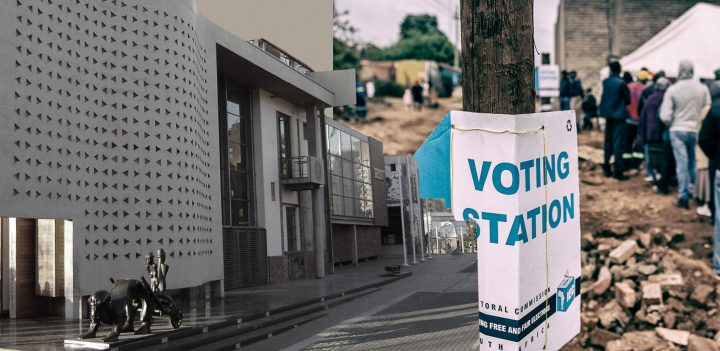LGE 2021
Concourt to decide whether October elections will go ahead

The constitutional dilemma of deciding whether municipal elections scheduled for October will be free and fair has been placed in the hands of the Constitutional Court. On Friday, the Independent Electoral Commission (IEC) made an urgent application to have elections postponed
With just over two months to go until the proclaimed date for the local government elections, the IEC approached the Constitutional Court on an urgent basis for a declaratory order postponing the voting day to 28 February 2022.
The February date is as per recommendations by former Deputy Chief Justice Dikgang Moseneke’s report that found that elections scheduled for 27 October this year would not be free and fair under the current conditions of the Covid-19 pandemic.
The application follows the gazetting of the October election date by Minister of Cooperative Governance and Traditional Affairs (Cogta) Nkosazana Dlamini-Zuma earlier this month. Her reasoning for doing so, based on legal advice, was to fulfill her constitutional and statutory obligations to “timeously” proclaim an election date which was said to be a legal requirement for the IEC to be able to approach the courts for a postponement.
Friday’s marathon virtual sitting saw the IEC argue that due to the pandemic, it could not organise constitutionally compliant elections for October.
Represented by advocate Wim Trengove, the main relief sought by the commission was:
- Declaring that the elections may be held outside of the 90-day period prescribed in section 159(2) of the Constitution and section 24(2) of the Municipal Structures Act, 1998
- Directing the commission to hold the upcoming local government elections by no later than the end of February 2022; and
- Authorising the Cogta minister to withdraw the notice calling the upcoming local government elections and setting 27 October 2021 as the date on which they will be held; and issue a new notice setting a date before 28 February 2022.
Political parties, including the ANC, EFF and DA, as well as civil society groupings such as the Institute for Race Relations, were admitted as intervening parties or amicus curiae in the application.
In addition, if the commission’s main relief is unsuccessful, it asked the court to declare that “failure to hold the municipal elections by 1 November 2021 is unconstitutional and invalid and suspend the declaration of invalidity until the end of February 2022”, according to court papers.
Based on the 90-day rule, by law the local government elections (which happen every five years) are required to be held by 1 November as the last election took place on 3 August 2016.
A further alternative remedy requested was for the court to take on a supervisory role to ensure the commission arranges constitutionally compliant elections for February 2022 and to grant an order that municipal councils “remain competent until newly elected councils are declared elected to avoid uncertainty about the legal status of current municipal councils”.
The DA, which opposed the postponement, argued that delaying elections was not in the best interests of the electorate, especially in municipalities with underperforming or corrupt councillors.
Represented by advocate Max du Plessis, the DA contended that the court has no power to postpone the elections as it would amount to a constitutional amendment, which only Parliament has the power to do. Further, it would set a dangerous precedent and undermine the supremacy of the Constitution.
Acting Chief Justice Raymond Zondo asked Trengove whether the commission’s application was a veiled attempt at seeking a constitutional amendment to which he said it would be “inappropriate” for the IEC to do so.
Justices Leona Theron and Mbuyiseli Madlanga questioned why the IEC had not approached Parliament instead of the courts to resolve the dilemma as the IEC is accountable to the legislature rather than the judiciary, which poses a threat to the separation of powers.
The IEC’s case was largely pinned on the argument that it is “impossible” for it to fulfill its constitutional duties of holding an election on the prescribed date.
“The Constitution does not demand the impossible,” said Trengove.
The February date is based on the vaccine roll-out reaching a target of 70% of the population. Justice Steven Majiedt raised concerns that vaccine hesitancy could throw a spanner in the works.
Trengove argued that a possible risk of holding elections for the sake of meeting the deadline is that they may be overturned if they are not considered free and fair, nor would they have political credibility as some parties would be disadvantaged in their attempts to canvas.
While Du Plessis argued on behalf of the DA that electronic means of campaigning were possible, a debate ensued when parties such as the EFF, ANC and IFP who were in support of the IEC’s application said they relied on in-person strategies such as rallies and door-to-door campaigning to reach poorer members of the electorate.
The DA criticised Dlamini-Zuma for prematurely declaring an election date, to which council for Cogta advocate Ngwako Maentje said this implied that the IEC had “connived” with the minister.
Du Plessis also contended that the IEC had previously stated that it was ready to hold an election in October and therefore should proceed.
Western Cape Cogta MEC, Anton Bredell, who along with the DA opposed the application, wrote in his founding affidavit that the IEC had failed to disclose to the court that it was prepared to hold elections after it made a presentation to the provincial government on 21 May.
Counsel for the Economic Freedom Fighters (EFF), Mfesane Ka-Siboto, said the party was also requesting that the IEC extend the date for the submission of candidate nomination lists due on 23 August.
Moreover, in the event that the IEC’s application is dismissed, the party asked that the government amend Disaster Management Regulations to allow gatherings. DM



















 Become an Insider
Become an Insider
Comments - Please login in order to comment.